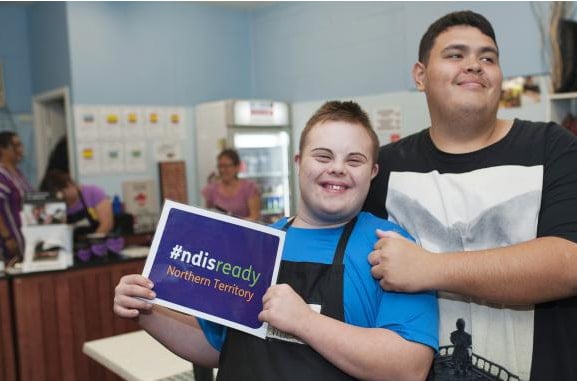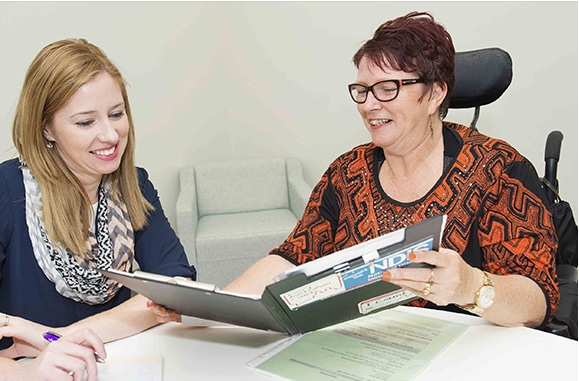NDIS
WHAT IS A NATIONAL DISABILITY INSURANCE SCHEME (NDIS)?
The NDIS will be aimed at those who are most in need, providing long term, high quality support for around 410,000 people who have a permanent disability that significantly affects their communication, mobility, self-care or self-management. It will focus on intensive early intervention, particularly for people where there is good evidence that it will substantially improve functioning or delay or lessen a decline in functioning. It will also include a comprehensive information and referral service, to help people with a disability who need access to mainstream, disability and community supports. The NDIS will give all Australians the peace of mind to know that if they have or acquire a disability that leaves them needing daily assistance with everyday life, or if they care for someone who has a disability, that they will be supported.

How will it improve the lives of people with disability, their family and carers?
The NDIS will look beyond immediate need, and will focus on what’s required across a person’s lifetime. At its core will be:
- A lifetime approach – funding is long-term and sustainable. People with disability and their carers will have peace of mind that the individualised care and support they receive will change as their needs change.
- Choice and control – people choose how they get support and have control over when, where and how they receive it. For some, there may be the potential to manage their own funding.
- Social and economic participation – people with disability will be supported to live a meaningful life in their community to their full potential.
- Focus on early intervention – the system will have enough resources and will be smart enough to invest in remedial and preventative early intervention instead of just providing support when a family is in crisis.

Who will be eligible?
The NDIS will work with people who have a permanent disability that significantly affects their communication, mobility, self-care or self-management to ensure that they get the support that is reasonable and necessary to meet their needs. This could include an individual plan and an individually funded package. Individual support will also be given to people for whom there is good evidence that early intervention would substantially improve functioning (for example, autism, acquired brain injury, cerebral palsy or sensory impairments), and those for whom early intervention will delay or lessen a decline in functioning (for example, multiple sclerosis and Parkinson’s disease). Others will be able to use the scheme to get information about what supports they might be able to use in the community (for example community groups like sporting clubs) and from other government programs such as health, employment support and education.
What has been done so far?
The Australian State and Territory Governments have started work immediately in building a NDIS. Progress to date includes:
- Establishing a Select Council of Treasurers and Disability Services Ministers on Disability Reform to drive development of the NDIS. The Select Council is supported by an Advisory Group.
- The Government has appointed four expert groups to work under the Advisory Group to guide the more technical requirements of scheme design. Expert groups have been set up to guide: eligibility and assessment, quality and safeguards, sector and workforce capacity and a national approach to control and choice of the NDIS.
- The Australian Government committed $10 million to support the technical work required to lay the foundations for a launch of the NDIS Scheme. This is allowing the governments to work together to build the critical components, taking into consideration issues such
as funding, governance, eligibility, assessment, quality standards and workforce and sector capacity.
- The Australian Government committed an additional $10 million for projects that examine what needs to be done so that service providers and their workers are able to deliver individual, personalised care, where people with disability and their families and carers have genuine control over the support provided to them.
- The Australian Government committed $1 billion to support the first stage of the NDIS from July 2013.
- The Australian Government announced a dedicated agency that will manage the implementation of the first stage of the NDIS.
I am a carer. How will an NDIS help me?
A core aim of the NDIS is to better support families in their caring role, and to ensure that role is nurtured and can be sustained. We know that our current system sometimes overlooks the role of family and carers, and doesn’t support long-term, sustainable care. The NDIS will move away from the crisis model where families only receive support if they are unable to continue in their caring role and there are no other options. Instead, it will work with families before they reach crisis to make sure that the valuable informal care they provide can be sustained.
How can I get involved? How can I have a say?
We recognise that people with disability, their families and carers must be at the centre of this reform. These are the very people who have a unique knowledge and understanding of what’s needed. We also need to involve the disability sector and expert groups to provide advice and guidance on some of the more technical issues. The NDIS Advisory Group has been established to provide independent advice to the Select Council on Disability Reform. The Advisory Group will be engaging with people with disability, their families and carers, stakeholders and the sector on the foundations necessary for reform and the overall design of the NDIS. The Government has also funded the National Disability and Carer Alliance to engage with the community and disability sector. As part of the engagement process, the Alliance will develop and organise forums for the community and disability sector to come together about the NDIS. The Alliance is made up of three peak disability bodies – National Disability Services, Carers Australia and the Australian Federation of Disability Organisations Details on how to get involved will be available soon. In the meantime, sign up for updates and keep in touch with the progress of the NDIS. For more information please visit www.ndis.gov.au
My Access Checker
My Access Checker is a tool to help people with permanent and significant disability understand whether they may be able to access assistance from the NDIS.




